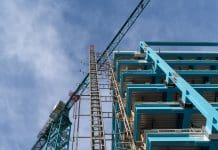The construction industry plays a vital role in delivering the infrastructure that underpins UK economic activity and public services. The longstanding challenges the sector faces are well known; however, construction productivity growth remains stubbornly stagnant. Richard Hipkiss, development director for the Modular & Portable Building Association, considers if Modern Methods of Construction (MMC) are part of the solution
Low construction productivity has plagued the industry for decades, driving up building costs, reducing profits and adding risk. According to government statistics, since 1997 the annual rate of improvement has been circa 21% lower than the wider economy.
Efforts to improve efficiency, however, have proven difficult in a sector too often defined by low margins, aggressive procurement, talent shortages and uncertain work pipelines.
A recent Royal Institution of Chartered Surveyors (RICS) Productivity Survey found that over one in five respondents from the UK and Ireland construction sector said they never measure labour productivity. So how can efficiencies be made if output is not assessed? The construction sector needs to sharpen up. Can you imagine managers in the manufacturing sector saying they never measure workflows?
Modular technology to improve construction productivity
Due to the more dynamic building method, data from RICS members demonstrate that volumetric modular technology can be 50% faster than onsite approaches such as brick and block.
Using cutting-edge digital design and manufacturing technology combined with the ability to carry out onsite groundworks at the same time as manufacturing modules, the efficiency benefits of this most advanced of offsite construction methods cannot be overlooked.
This would suggest that modern construction methods are very much part of ramping up productivity. By taking the construction process offsite into quality-controlled factory settings, production is constantly scrutinised.
In the case of volumetric modular systems, the process is standardised and well-honed. Through a combination of people and automation, production lines are digitally analysed and enhanced.
Reskilling the construction workforce
The recent Skills England report, published in September 2024, highlights a significant opportunity for the expansion of MMC to address construction productivity challenges and labour shortages.
In its analysis, Skills England outlines the urgent need for an additional 252,000 construction workers between 2024 and 2028, a figure presented by the Construction Industry Training Board even before Labour’s housebuilding plans were unveiled.
The report goes further, pointing out that the demand will not be limited to housing, with new transport, education, health and energy infrastructure also requiring a substantial increase in capacity.
Resilience in the sector
The report is cautious about the practical challenges of MMC adoption. The collapse of modular builders like Ilke Homes and Caledonian Modular raises questions about the sector’s resilience, with the report acknowledging the need for more strategic coordination and clear government intervention to prevent further failures.
The underlying challenges of the housing shortage are much more complex and political than simply finding a quicker way to build. Manufacturing facilities require substantial investment of time and money to set up and need a constant throughput of work to provide a return on that investment. As we have witnessed, the stop-start nature of residential construction is not conducive to keeping a factory running at capacity.
But we do not have to look further afield to see that volumetric modular construction can work. We just have to take a look at the UK commercial sector, particularly healthcare and education, where modular technology has been successfully exploited for decades.
Leading modular manufacturers within our membership strive to develop long-term strategic relationships by developing skills and specialisms in these sectors. By standardising, streamlining and automating major parts of the value chain, projects can benefit from the industrialisation of key construction tasks.
Accurate and reliable information
With volumetric modular construction all data can be validated and coordinated as part of a structured process, which helps provide accurate details at the point of handover in line with the requirements of the golden thread of information.
With its powerful combination of controlled deliverables and customisable outputs, modular construction provides cost and time efficiencies together with the repeatable quality and safety – meeting the key drivers and stringent protocols demanded by the construction sector.














